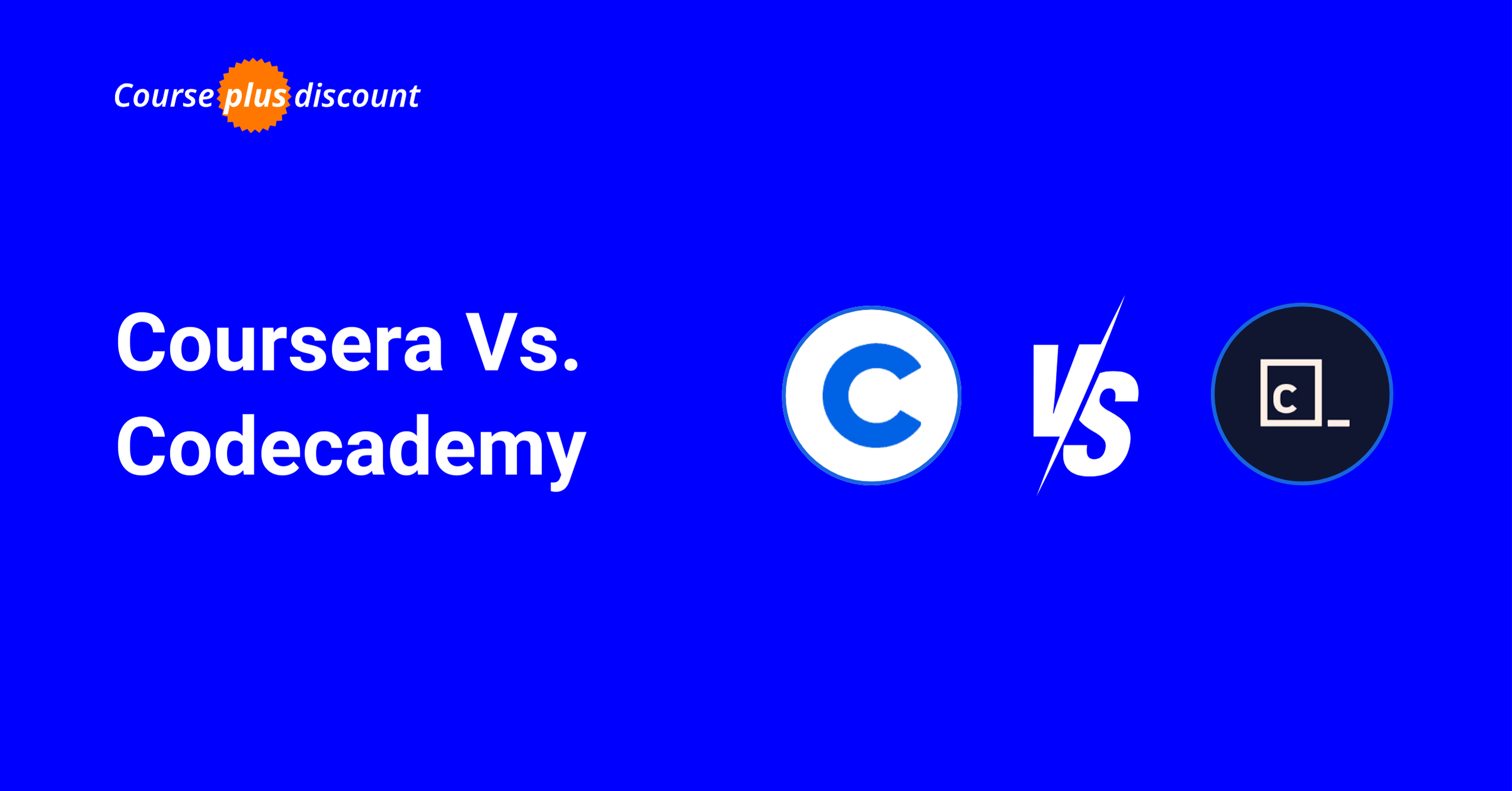Coursera and Codecademy are two popular online learning platforms catering to one goal: to educate students and upskill professionals.
Coursera is ideal for students, professionals, and businesses seeking university-level courses in various fields. It offers certifications, degrees, and career-oriented programs.
Codecademy, on the other hand, is designed for individuals looking to develop coding and technical skills through interactive learning. It focuses on hands-on programming exercises for beginners and aspiring developers.
In this article, we will compare both platforms based on key features, pricing, course offerings, and learning experiences to help you choose the right one for your goals.
Coursera vs. Codecademy: A Quick Overview
Coursera and Codecademy offer different learning approaches. Coursera provides academic courses from universities, while Codecademy specializes in interactive coding lessons.
The table below highlights their main differences.
| Feature | Coursera | Codecademy |
|---|---|---|
| Free Trial Period | 7-day free trial on Coursera Plus | 7-day free trial on Pro and Plus, 14-day free trial on Team Plan |
| Free Courses Available | Yes (Limited) | Limited free courses |
| Price Starts From | $49/month on Coursera Plus | $14.99/month for Individuals |
| Course Categories | Business, IT, Data Science, Personal Development, Arts, and more | Coding, Data Science, Web Development, and Computer Science |
| Certification | Yes, on paid plans, including professional certificates and degrees | Yes, after the subscription purchased |
| Teaching Method | Video lectures, quizzes, assignments, and peer-reviewed projects | Interactive coding exercises, projects, and quizzes |
| Mobile Access | Android & iOS | Android & iOS |
| Skill Paths | Guided learning paths with specializations and degrees | Career paths for structured learning |
| Allowed Team Users | 5 – 125 | 50+ |
| Best Suited For | Students, Businesses, and Professionals | Individuals focused on coding and software development |
Verdict (Based On Table): Coursera is a great choice for students and professionals seeking academic courses, career certifications, and diverse subjects. Codecademy is better for those who want to focus on coding through hands-on exercises. Teams looking to upskill in software development may also find Codecademy more suitable.
Course Offerings & Learning Experience
Both platforms provide valuable learning experiences but in different ways. Let’s explore what each platform offers.
Coursera Offerings
Coursera provides courses in various fields, including business, technology, personal development, etc. Courses are structured with video lectures, quizzes, and graded assignments, offering a mix of theoretical and practical knowledge.

Learning durations vary from a few hours to several months, with some courses leading to full degrees. Coursera also offers job-ready skills through professional certificates from companies like Google, IBM, and Meta, helping learners build expertise for career growth.
Codecademy Offerings
Codecademy focuses on programming, web development, and data science. Its hands-on courses allow learners to code directly in the browser with real-time feedback.

Unlike Coursera, Codecademy skips long video lectures and focuses on interactive exercises and projects. Courses range from beginner-friendly tutorials to advanced skill paths. This lasts from a few weeks to several months. Codecademy’s job-ready programs include coding interview prep and career paths, making it ideal for developers.
Do They Have Certification & Accreditation?
Both Coursera and Codecademy offer certificates upon course completion, but their accreditation differs. Understand it neatly with the below explanation;
Coursera Certification
Coursera offers various certifications, including 130+ Professional Certificates, MasterTrack Certificates, Specializations, and degrees.
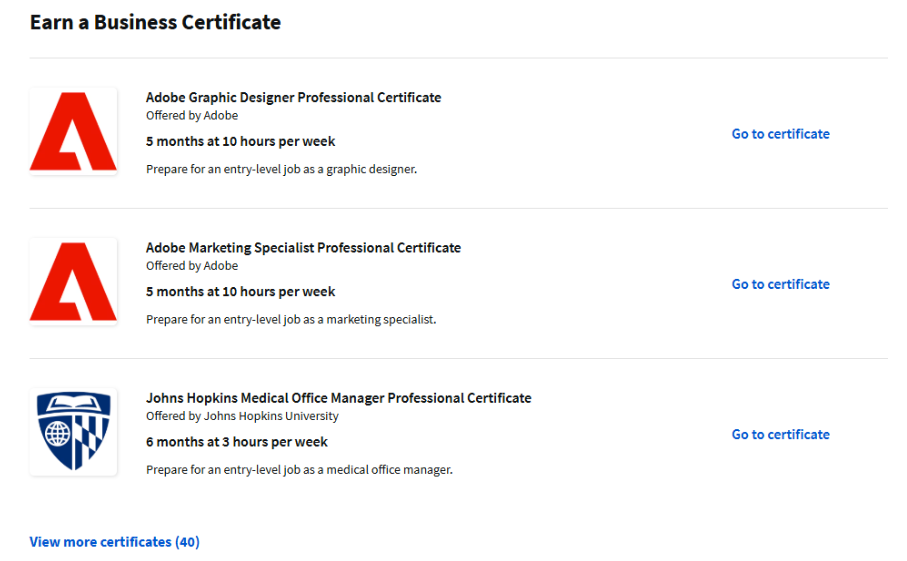
Professional Certificates are especially for career advancement and take only a few months to complete. Mastertack courses offer a university certificate and credits toward a degree, lasting 4 to 7 months. Specialization courses focus on a specific skill, while degrees can take 2 to 4 years.
Many certifications are accredited through renowned universities like Stanford, Yale, University of London, etc., and organizations such as Google, Microsoft, Intuit, IBM, and many more. These certifications validate expertise in fields such as business, data science, IT, and healthcare.
Codecademy Certification
Codecademy offers Certificates of Completion and Professional Certifications in coding, web development, data science, cybersecurity, and IT. The duration of Codecademy courses varies, with some short courses taking a few weeks.
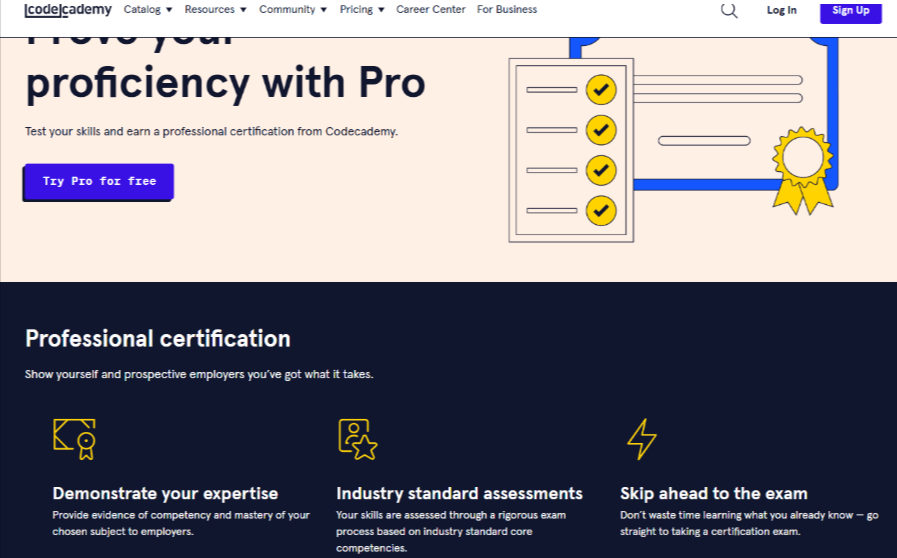
However, Career Paths can take six months or more. Codecademy’s certificates are not accredited by universities or professional institutions. Despite this, they are widely accepted in the tech industry as proof of coding proficiency.
The platform’s interactive learning approach helps users build real-world coding skills, making it ideal for those pursuing software development and data science jobs.
Verdict: Coursera provides accredited certificates from universities and companies, while Codecademy’s certificates are not officially accredited but are still recognized by employers in the tech industry. So, the choice is yours, as both platforms’ certificates are worth it in their own sectors.
Free Trial And Free Courses
Both platforms provide free trial options and limited free courses. Let’s see what they offer for Individuals and Teams;
Coursera Free Trial/ Free Courses
Coursera provides a 7-day free trial on Coursera Plus. This allows access to multiple courses with 10,000+ content. It is ideal for students, professionals, and businesses looking to explore premium content before committing to a paid

After the trial, you will need to pay to continue learning. Coursera also offers free courses in various subjects, such as business, data science, and personal development. However, the free courses provided are limited compared to a free trial and paid version.
These free courses, which provide a great introduction to various fields, can be accessed by both beginners and experienced learners. However, certificates for free courses are usually not included unless you upgrade to a paid plan.
Learn to apply for a Coursera Plus free trial for 7 days and explore the advanced programs/ courses that are not offered in free courses.
Codecademy Free Trial/ Free Courses
Codecademy offers a 7-day free trial on Pro and Plus plans and a 14-day free trial for Team Plans. It is best for individuals and teams who want to test premium features before purchasing a subscription.
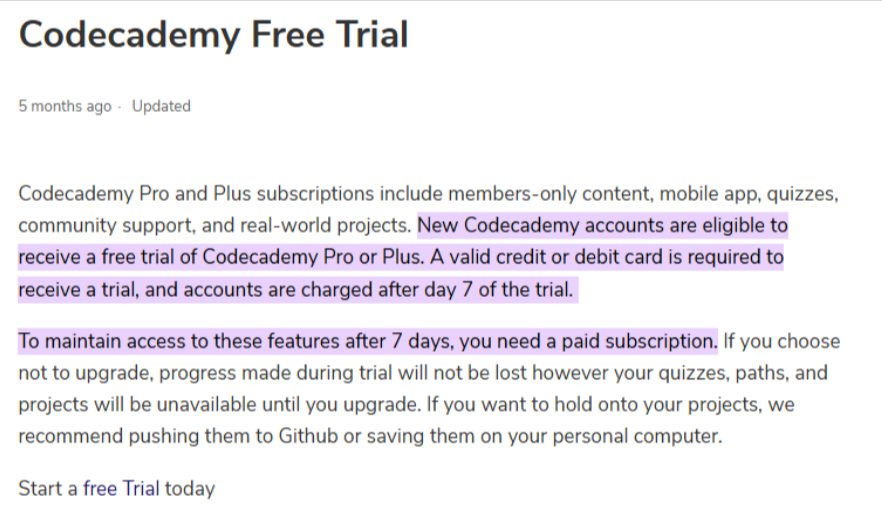
Codecademy also provides limited free programming, web development, and data science courses. However, compared to the free trial, there are basic courses in the free plan that suit only beginners and self-learners looking to explore basic coding concepts.
You can pursue the tending subjects and languages, whether on a free trial or enrolled in a free plan from AI, Python, JavaScript, HTML & CSS, SQL, etc.
Verdict: If you are on a team and seeking more days of free trial, then Codecademy is for sure the best option. But if you want to explore various subjects, Coursera plus free trial works well for enthusiastic learners.
Coursera vs Codecademy: Pricing Differences
Coursera and Codecademy offer various pricing plans for different learners, from individuals to businesses. Their pricing structures vary based on access levels, certification, and additional features. Here’s a look at each platform’s pricing plans.
Coursera Pricing Structure
Coursera offers a variety of pricing plans suitable for individuals and teams, each catering to different needs and preferences. Check out the breakdown below:
| Coursera Plans | Price |
|---|---|
| Single Learning Program | $49 to $79/ month |
| Coursera Plus Monthly | $59/ month |
| Teams | $399/ Year |
| Enterprise | Contact Sales |
These plans provide access to various courses, certifications, and degree programs. The Single Learning Program is best for individual learners, where Coursera charges per course, while Coursera Plus Monthly gives unlimited course access without payment for each program.
Teams and Enterprise plans are ideal for businesses, providing team-based learning and advanced features. Besides this pricing structure, Coursera offers guided projects starting at $9.99 per month, MasterTack certificates from $2000, and degrees from $9000.
Additional Information: For more detailed pricing and features, read Coursera Pricing. This will help you choose the best plan for your goal and budget.
Codecademy Pricing Structure
Codecademy offers pricing options depending on whether you’re an individual or part of a team. See the options below:
| Plans | For Individual | For Individual | For Team | For Team |
|---|---|---|---|---|
| Structure | Plus | Pro | Teams | Enterprise |
| Monthly Billing | $29.99/ month | $39.99/ month | N/A | N/A |
| Annual Billing | $14.99/month | $19.99/ month | $299/user | Custom |
Codecademy’s Plus and Pro plans cater to individual learners. The Plus plan offers guided paths, quizzes, and real-world projects, while the Pro plan includes advanced features like certificates, interview prep, and portfolio-building projects.
The Teams plan is ideal for businesses, providing admin tools, progress tracking, and skill insights. In contrast, the Enterprise plan offers customized training solutions, dedicated support, and tailored learning paths for large organizations.
Inclusion: Teaching Style And Learning Methods
Coursera and Codecademy follow different teaching styles. Coursera focuses on academic, video-based learning, while Codecademy provides hands-on, interactive coding experiences.
Coursera Teaching Style
Coursera follows a structured, video-based learning method with quizzes, assignments, and peer-reviewed projects. It covers various subjects, including Data Science, Business, Computer Science, IT, Language Learning, Health, Personal Development, Physical Science, Social Sciences, Arts, and Math.
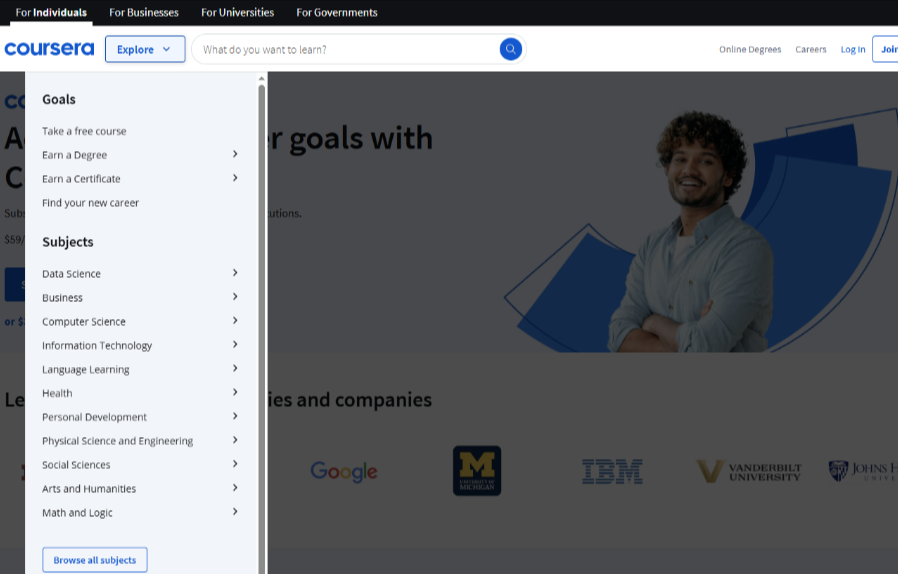
Coursera courses are accessible via the web and mobile apps on iOS and Android devices. This makes learning flexible and convenient for everyone from anywhere. Learners can take free courses, earn certificates, or even complete full degrees to enhance their careers.
Codecademy Teaching Style
Codecademy offers an interactive, hands-on coding experience, allowing learners to practice coding directly within their browsers. The platform covers many subjects, including Python, JavaScript, HTML & CSS, SQL, Java, C++, C#, C, PHP, R, IT, cybersecurity, cloud computing, AI, web development, data science, web design, and professional skills.
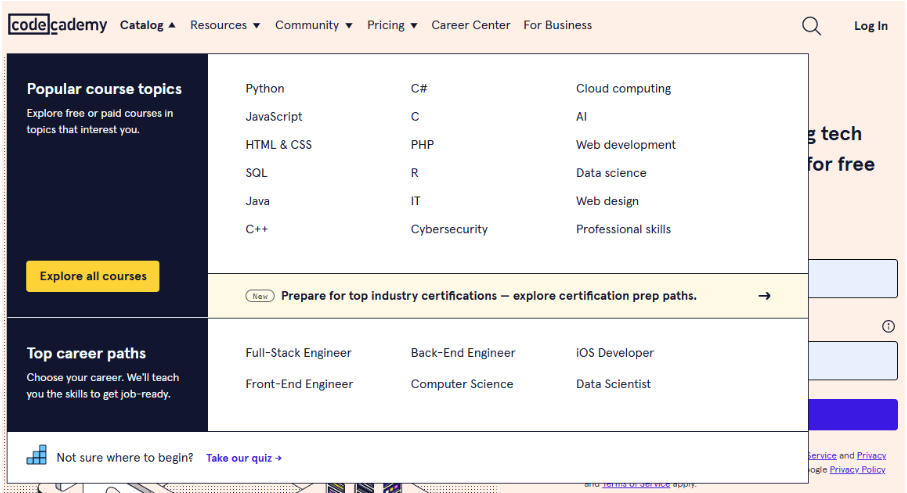
Lessons are structured through interactive coding exercises, quizzes, and real-world projects. Codecademy provides guided learning paths and career tracks to help users specialize in specific areas. It is accessible via a web browser and a Codecademy mobile app, enabling learners to study on the go.
Team And Business Solutions
Both platforms offer plans designed for teams and businesses, allowing for collaboration and organizational growth.
Coursera Team Plan
The Team Plan on Coursera includes 5-125 members, offering collaborative learning, tailored solutions, and advanced analytics. Teams benefit from streamlined access to various courses, professional certificates, and degrees.

This makes it easier to train employees effectively. Coursera’s Business Solutions provides customized learning paths for employees to gain industry-relevant skills, ensuring growth and improved productivity.
Codecademy Team Plan
Codecademy’s Team Plan includes 50+ members. The platform offers personalized learning tracks, performance insights, and scalable solutions.

With advanced features like custom reports and learning management systems, businesses can align training programs to their needs. Codecademy’s Business Solutions helps teams develop coding and technical skills that are crucial for success in the digital age.
Verdict: Based on the team plans of both platforms, Coursera allows multiple members to join the course, which helps more team members to upskill. So, Coursera is the best platform for businesses.
Pros And Cons Of Coursera And Codecademy
Understanding Coursera’s and Codecademy’s pros and cons can help learners choose the best platform based on their goals, budget, and learning style.
Coursera Pros
Coursera stands out with its wide range of academic and professional courses. It collaborates with top universities and companies, making it a strong choice for structured learning.
- University-Backed Courses: These courses are created by leading universities and institutions, ensuring high academic quality.
- Certifications & Degrees: The program offers industry-recognized certificates and degree programs for career advancement.
- Flexible Learning Options: Learners can choose self-paced courses or structured schedules with deadlines. Coursera offers a refund policy for eligible purchases within a specific timeframe if a course doesn’t meet learners’ expectations.
- Diverse Course Topics: Covers multiple disciplines, including business, healthcare, IT, and data science.
- Financial Aid & Free Courses: Many courses are available for free, with financial aid options for paid programs.
- Expert Instructors: Courses are taught by professors, researchers, and industry professionals.
Coursera Cons
Despite its advantages, Coursera has some limitations that may not suit all learners.
- High Costs for Degrees: Professional certificates and degree programs can be expensive for some students.
- Limited Hands-On Coding: Coding courses are more theoretical compared to interactive coding platforms.
- Time Commitment for Certificates: Some programs require several months to complete, demanding consistent effort.
- Not All Courses Are Free: Many advanced and high-quality courses require a paid subscription.
- Varying Course Quality: Some courses lack depth or engagement compared to university classrooms.
- Assignments Require Deadlines: Structured courses may have deadlines that limit flexibility for busy learners.
Codecademy Pros
Codecademy is a practical learning platform designed for coding enthusiasts. It emphasizes interactive coding exercises and structured paths for skill-building.
- Hands-On Learning: Features interactive exercises that allow users to code directly in the browser.
- Project-Based Curriculum: Learners build real-world projects that improve problem-solving and coding skills.
- Beginner-Friendly Courses: Provides step-by-step guidance, making coding accessible for complete beginners.
- Multiple Programming Languages: Covers Python, JavaScript, SQL, C++, and more for various career paths.
- Self-Paced Learning: Allows learners to progress at their own speed without strict deadlines.
- Affordable Plans: The platform offers lower-cost subscriptions than traditional coding boot camps.
Codecademy Cons
While Codecademy is great for coding practice, its drawbacks may impact learners looking for a broader education.
- Lacks Accredited Certificates: Universities or employers do not widely recognize Codecademy certificates.
- Limited Theoretical Depth: Focuses more on coding exercises than computer science concepts.
- No Personalized Instructor Feedback: Lacks direct interaction with instructors for personalized guidance.
- Limited Non-Tech Subjects: It does not offer business, healthcare, or other professional skills courses.
Which Is The Best Platform To Choose?
Having used both platforms for a few months, I have found that Coursera is perfect for structured learning while Codecademy is great for hands-on coding practice.
If you want a guided experience with university-backed courses and career-oriented certifications, Coursera is the way to go. However, if you prefer an interactive, practice-based approach to coding without heavy theory, Codecademy is a good choice.
The decision depends on your goals; you can choose Coursera for education and recognized certificates or Codecademy for learning to code efficiently with real-time exercises. Both platforms provide value, but your needs should determine the best fit.
Conclusion: Coursera Is Best If Looking For Accredited Certification
If your goal is to earn recognized certificates or even a degree, Coursera is the better choice. It partners with universities and organizations to offer quality education with industry credibility.
In competition to it, Codecademy is ideal for quickly learning programming languages through hands-on practice but lacks accreditation. While both platforms are great for self-improvement, Coursera provides structured learning, career advancement opportunities, and broader subject coverage.
If you’re serious about certifications that add value to your resume, Coursera is the best option to move forward with.
FAQs
Codecademy certificates show that you have completed a course, but they are not officially accredited. They can still help showcase your skills to employers.
Including Codecademy on your resume can highlight your coding skills and dedication to learning. It’s best to list it under skills or additional training rather than formal education.
A Coursera certificate can help in job applications, especially if it’s from a recognized university or company. However, experience and practical skills are also important for employment.
One year is enough to learn coding basics and build projects. Mastering it depends on practice, the complexity of your chosen languages, and your career goals.
Some Coursera certificates are accredited, especially those from universities and professional programs. They can add value to your resume and improve your job prospects in specific fields.
